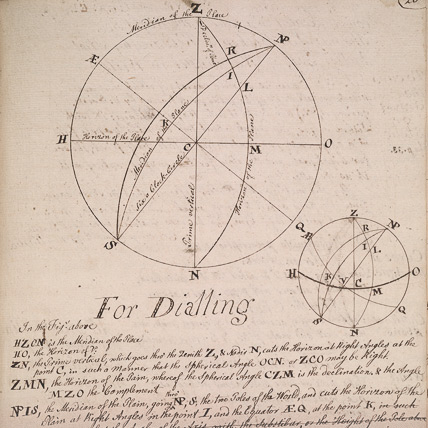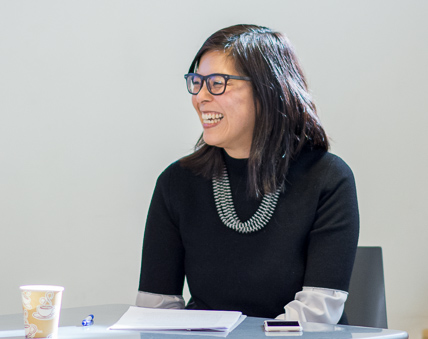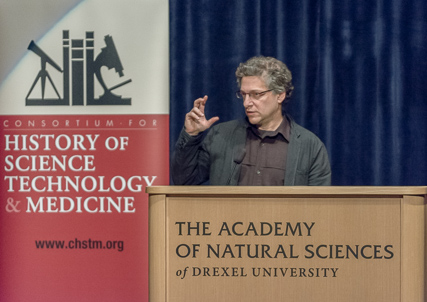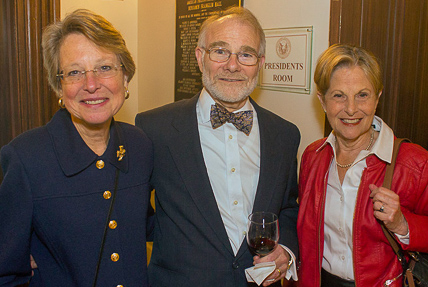News of the Consortium
June 2016

Commonplace book concerning science and mathematics by Mary Smith
(Thorney Abbey, UK, ca. 1769). Image courtesy of The Smithsonian Libraries.
The sheer breadth of topics explored and research methods employed by scholars at the Consortium is fascinating. They work at the intersection of a wide variety of fields in the humanities and in the sciences, technology and medicine and health. They ask many different kinds of questions and use different kinds of evidence and analysis to answer their questions. The brief project descriptions below and the reports on our website illustrate this breadth. Scholars study the detailed production of technical practices as well as the contexts in which such practices are developed, deployed and interpreted. All of this topical and analytical richness makes possible many potential connections with diverse audiences and scholarly communities, inside and outside of academia. The Consortium works hard to support this scholarship and to foster these connections.
We are now winding up another year of exhilirating activity and have already begun preparations for the next. Thank you for your paricipation and support. Stay tuned for more!
|
| Fellowships |
| 2016-17 Fellows |
We are delighted to welcome our new class of fellows for 2016-2017. The Consortium received 107 applications this year, up from 77 last year. The applications were read by 34 librarians and archivists from the 24 member institutions as well as 23 historians from around the world. These readers awarded one NEH postdoctoral fellowship, two dissertation writing fellowships and 12 research fellowships. Together, these fellows will make about 60 research trips to the collections of member institutions.
|

|
Leah Aronowsky, Harvard University
Research Fellow
Configuring "Life" in the Biosphere, 1950-2000
|

|
George Aumoithe, Columbia University
Research Fellow
Epidemic Preparedness in the Age of Chronic Illness: Public Health and Welfare Politics in the United States, 1965-2000
|

|
Sarah Basham, University of British Columbia
Dissertation Writing Fellow
Rethinking the Ontology of Chinese Encyclopedias: The Life and Times of Treatise on Military Preparedness (1621)
|

|
AJ Blandford, Rutgers University
Research Fellow
Labor and the Visualization of Knowledge in Americam Geological Surveys
|

|
Nicholas Bonneau, University of Notre Dame
Research Fellow
Unspeakable Loss, Distempered Awakenings: North America's Invisible Throat Distemper Epidemic of 1735-1765
|

|
Melissa Charenko, University of Wisconsin-Madison
Research Fellow
"The Science of Prophecy"? The Role of the Paleo-Disciplines in the Face of Anthropogenic Change, 1916-2015
|

|
Rosanna Dent, University of Pennsylvania
Fellow-In-Residence
Studying Indigenous Brazil: The Xavante and the Human Sciences, 1958-2015
|

|
Betsy Frederick-Rothwell, University of Texas, Austin
Research Fellow
Inside Out: Office Buildings and the Hybrid Nature of Space, 1870-1930
|

|
Louis Gerdelan, Harvard University
Research Fellow
Calamitous knowledge: understanding disaster in the British, Spanish and French Atlantic worlds, 1666-1755
|

|
Alison Laurence, Massachusetts Institute of Technology
Research Fellow
An Unnatural History of Deep Time: Extinct Animals & the Politics of Place in the Modern United States
|

|
Christine Peralta, University of Illinois, Urbana-Champaign
Research Fellow
Labor Pains: Working Class Women's Access to Healthcare in the Philippines, 1898-1950
|

|
Alicia Puglionesi, Johns Hopkins University
NEH Postdoctoral Fellow
The Astonishment of Experience: Americans and Psychical Research, 1885-1935
|

|
Tricia Ross, Duke University
Research Fellow
Care of Bodies, Cure of Souls: Medicine and Religion in Early Modern Germany
|

|
Michelle Smiley, Bryn Mawr College
Dissertation Writing Fellow
Becoming Photography: The American Development of a Medium
|

|
Angela Smith, Austin Community College
Research Fellow
The Romantic Roots of Evolution in Scotland
|

|
Oscar Moisés Torres Montúfar, El Colegio de México
Research Fellow
Miners, Oilmen and Chemists: Globalization and Technology in Mexican Sulphur Industry (1933-1972)
|
| Past Fellows Updates |
|

|
Kathernine Arner, Johns Hopkins University
2011-2012 Research Fellow
Katherine is in her second year as postdoctoral fellow at the Institute for the History of Medicine at Johns Hopkins University and is curating the university's very first cross-campus exhibit, "Hopkins and the Great War." Timed to coincide with the 100th anniversary of World War I, this cross-campus exhibit will explore multiple facets of the relationship between Johns Hopkins University and the global conflict. It will debut in exhibit halls at the School of Medicine, School of Nursing and the Sheridan Libraries this coming fall.
|

|
Susan Hanket Brandt, University of Colorado, Colorado Springs
2011-2012 Research Fellow
Susan was awarded the 2016 Lerner-Scott Prize from the Organization of American Historians. The OAH Lerner-Scott Prize is given annually for the best doctoral dissertation in U.S. women’s history.
|

|
Benjamin Breen, Columbia University
2011-2012 Research Fellow
Ben completed his PhD from UT Austin's history department in May 2015 and took up a postdoctoral fellowship at the Society of Fellows at Columbia University in August. Last spring he was offered a tenure-track position at UC Santa Cruz's Department of History, which he'll join in January of 2017. His dissertation, "Tropical Transplantations," was recently awarded UT Austin's Outstanding Dissertation Award for 2016.
|

|
Abe Gibson, Florida State University
2014-2015 Postdoctoral Fellow
Abe's first book,
Feral Animals in the American South: An Evolutionary History, is forthcoming with Cambridge University Press and is expected to appear in summer of 2016.
|

|
Heidi Hausse, Princeton University
2014-2015 Dissertation Writing Fellow
Heidi is scheduled to defend her dissertation in mid-May 2016. She'll join the Columbia University Society of Fellows for 2016-2019 and has received the Molina Fellowship in the History of Medicine at the Huntington.
|

|
Chris Heaney, Penn State University
2011-2012 Research Fellow
As of summer 2016, Chris will begin as assistant professor of Modern Latin American History at Penn State, and as a Barra Postdoctoral Fellow at the McNeil Center for Early American Studies at the University of Pennsylvania.
|

|
Kate Irving, Yale University
2013-2014 Research Fellow
Irving submitted her dissertation, “Happy and Useful: Educating Children with Disabilities in Nineteenth-Century America,” for December 2016 graduation. In January 2016 she returned to Australia with her partner and toddler, to return to full-time clinical practice in pediatrics.
|

|
Lijing Jiang, Nanyang Technological University
2013-2013 Research Fellow
In 2015, Jiang became a postdoctoral fellow at the School of Humanities and Social Sciences, Nanyang Technological University, Singapore. Her recent publications include "Retouching the Past with Living Things: Indigenous Species, Tradition, and Biological Research in Republican China, 1918-1937," Historical Studies in the Natural Sciences 46, no. 2 (April 2016): 154–206, and (with Hallam Stevens) "Chinese Biotech versus International Ethics? Accounting for the China–America CRISPR Ethical Divide," BioSocieties 10 (December 2015): 483-488.
|

|
Alexander Moffett, University of Chicago
2015-2016 Research Fellow
In summer 2016, Alex will begin a residency in internal medicine at Johns Hopkins Hospital.
|

|
Douglas O'Reagan, University of Washington— Tri Cities
2012-2013 Research Fellow
In August 2016, Douglas will take up a postdoctoral fellowship at MIT, consulting on the future of the digital humanities at MIT.
|

|
Lisa Ruth Rand, University of Pennsylvania
2015-2016 Dissertation Writing Fellow
This year Ruth held the 2015-2016 NASA Fellowship in the History of Space Technology. In fall 2015, she presented a paper titled "Up to Earth: Falling Space Junk and the Spatial Expansion of Environmental Politics during the Long 1970s" at the Society for the History of Technology annual meeting, and was a featured guest on the podcast at Environmental History Resources. In spring 2016 she attended, presented a paper, and organized a panel at the American Society for Environmental History annual meeting. Her recent publications include (with Dave Baiocchi) Good Seeing: Best Practices for Sustainable Operations at the Air Force Maui Optical and Supercomputing Site (RAND Corporation, 2016) and a review of Turchetti and Roberts, eds., The Surveillance Imperative: Geosciences during the Cold War and Beyond, published in Quest: The History of Spaceflight Quarterly 23 no. 1 (2016). She has publications forthcoming in several forums, including Isis, the Smithsonian Institution, and Physics World. In the spring semester Ruth was awarded a 2016-2018 Mellon Postdoctoral Fellowship in the Humanities at the University of Wisconsin-Madison.
|

|
James Risk, University of South Carolina
2015-2016 Research Fellow
Risk was recently awarded the John A. and Annie Rice Excellence in Teaching Award by the Department of History of the University of South Carolina. Risk also won a Pam Laird Research Grant from the Mercurians, a Special Interest Group of the Society for the History of Technology, a Clyde Ferrell Summer Dissertation Research Fellowship from the Department of History of the University of South Carolina, and a Richard A. Bacas Scholarship from the George Mason University Institute for Humane Studies.
|

|
Dora Vargha, University of London, Birbeck College
2010-2011 Research Fellow, 2015-2016 Research Fellow
Dora's paper, "Between East and West: Polio Vaccination Across the Iron Curtain in Cold War Hungary," Bulletin of the History of Medicine 88 (2) Summer 2014, was awarded the 2016 J. Worth Estes Prize of the American Association for the History of Medicine. The prize is awarded for the best published article in the history of pharmacology. Dora organized a conference in London in late May titled After the End of Disease, for which she received a Wellcome Trust Small Grant.
|
Fellows' Research Reports
|

|
Tess Lanzarotta, Yale University
2015-2016 Research Fellow
A Lab at the Top of the World: Circumpolar Health and Indigenous Politics in Cold War Alaska
|

|
Sarah Sussman, University of Texas at Austin
2015-2016 Research Fellow
Divining a Usable Past: Psychical Research and the High-Culture Novel, 1880-1940
|

|
Shana Lopes, Rutgers University
2015-2016 Research Fellow
"The fraternity throughout the world": American and German Photography, Interactions from 1840 to 1890
|

|
David Ceccarelli, University of Rome–Tor Vergata
2015-2016 Research Fellow
Between Cope and Osborn: the Role of the American Biological Discourse on the Public Debate on Evolution
|

|
James Risk, University of South Carolina
2015-2016 Research Fellow
Coastal Identities: Science, Technology, Commerce and the State in American Seaports, 1790-1850
|
|
| Events |
Public Events |

Eugenia Lean of Columbia University speaking at a workshop at UPenn.
In December 2015, Kapil Raj presented a public lecture on "Connecting Chronologies, Constructing Historical Anthropology: William Jones in Calcutta and his Legitimation of Empire." Raj is Directeur d'études in the Centre Alexandre Koyré of the Ecole des haute etudes de sciences sociales, Paris, and his research focuses on the role of circulation and cultural interactions in the formation of knowledge and science. Raj's lecture was followed by a half-day workshop on "Problematizing the Local in Global Histories of Science" that included presentations from Raj as well as Daud Ali (University of Pennsylvania), Pablo Gomez (University of Wisconsin-Madison), Eugenia Lean (Columbia University), Clapperton Mavhunga (MIT), and Joanna Radin (Yale University). These events were co-sponsored by the Consortium and the University of Pennsylvania's South Asia Center.

Peter Galison of Harvard University discussing his film, Containment, with the audience at the Academy of Natural Sciences.
In April 2016, the Consortium teamed up with the Academy of Natural Sciences of Drexel University to present a film screening and discussion of Peter Galison and Robb Moss's new film, Containment. The film explored the problem of nuclear waste containment and how governments and artists have imagined humanity's future engagement with these materials – some of which will remain deadly for more than 10,000 years. Peter Galison (Harvard University) answered questions from the audience after the screening.

Chris and John Van Horne with Charlotte Jacobs (on the right) at the American Philosophical Society.
In May 2016, Charlotte Jacobs presented the Library Company of Philadelphia's Third Annual John Van Horne lecture, speaking on her new biography, Jonas Salk: A Life (Oxford University Press, 2015). Jacobs is Professor of Medicine, Emeritus, at Stanford University. The event was co-sponsored by the Consortium, the Library Company of Philadelphia, and the American Philosophical Society.
|
Working Groups |
The working groups met more than 50 times this year. They will reconvene in September. More than 130 individuals from 72 institutions participated this year. The geographical reach of the working groups is larger than ever. Participation by scholars affiliated with an institution more than 100 miles from Philadelphia rose from 40% last year to 50% this year. The Consortium's online participation option is also growing in popularity. About half of the participants joined online this year, compared to about 1/3 last year. Online participants have beamed in from as far away as Tel Aviv, Utrecht, Beijing and Singapore.
The different groups adopted a range of formats for their meetings. The group on History and Philosophy of Science read one book each semester. Nancy Nersessian joined the group online for the final discussion of her book Creating Scientific Concepts. The group on the History of Medicine and Health often featured an author and several commentators. Some of their sessions were discussions involving authors of books on related topics. The groups on Science Beyond the West and Early Science held a joint session in which Dimtri Gutas and H. Floris Cohen discussed Cohen's How Modern Science Came into the World: Four Civilizations, One 17th Century Breakthrough.
Follow the links below to see more about the groups' activities and to contact the conveners about participating in the fall.
History and Theory
Suman Seth, Cornell University
Laura Stark, Vanderbilt University
History of Physical Sciences
Joe Martin, Michigan State University
Kathryn Olesko, Georgetown University
History of Earth and Environmental Sciences
Etienne Benson, University of Pennsylvania
Jody Roberts, Chemical Heritage Foundation
Jeremy Vetter, University of Arizona
History of Biological Sciences
Karen Rader, Virginia Commonwealth University
Betty Smocovitis, University of Florida
History and Philosophy of Science
Gary Hatfield, University of Pennsylvania
Miriam Solomon, Temple University
History of Early Sciences
Peter Dear, Cornell University
Paula Findlen, Stanford University
Daryn Hayton, Haverford College
Science Beyond the West
Harun Kücük, University of Pennsylvania
Projit Mukharji, University of Pennsylvania
History of Technology
Martin Collins, Smithsonian Institution
Heidi Voskuhl, University of Pennsylvania
History of Medicine and Health
Paul Theerman, New York Academy of Medicine
Nancy Tomes, Stony Brook University
Keith Wailoo, Princeton University
The working group on the History of the Human Sciences will also reconvene in the fall. Please contact us if you would like to participate.
|
| Collections Updates |
With the addition of catalog records from the Newberry Library, the Special Collections Search Hub now has nearly 4.4 million records for rare books and manuscripts held at member institutions.
Newly Acquired or Processed Collections
The New York Academy of Medicine Library recently acquired a German manuscript cookbook from ca. 1700, compiling several hundred recipes. The purchase adds to the Library's already extensive cookery collection, numbering some 10,000 items. In addition, four new finding aids have been made available online, including the records of three professional organizations (the New York Cardiological Society, the New York Clinical Society, and the New York Pediatric Society), as well as the papers of Charles Loomis Dana (1852-1935), a prominent New York neurologist. Read more here ...
The Historical Medical Library of the College of Physicians of Philadelphia recently began to sort and catalog medical trade ephemera, reprints, and government documents that were collected in the late 19th century and early 20th centuries. This collection consists of 700 boxes equating to approximately 70,000 uncatalogued items. The unique documents inside each box range from public health decrees in Philadelphia issued by the Office of the Mayor to World War I rehabilitation of “limbless soldiers” presented by the Red Cross. Read more here ...
The Johns Hopkins University Special Collections and Archives recently acquired the papers of physicist David P. Stern (1973-2010), biochemist and enzymologist Maurice Bessman (1956-2007), a Mary Ann Cowan herbarium including materials from 1835 and 1911, and a Lorrain Sherman Hulburt mathematics textbook from 1918. Read more here ...
|
| Previous Newsletters |

At our beginning in 2007.
The first issue of this newsletter was distributed in 2010, three years after the start of what was then known as the Philadelphia Area Center for History of Science. Explore past issues of the newsletter for information about fellows and how the Consortium has grown.
| |
|